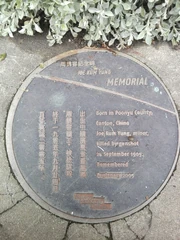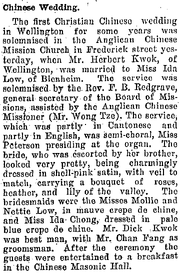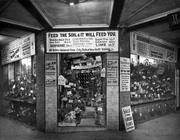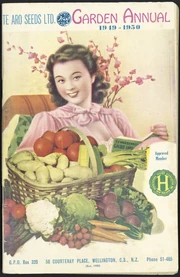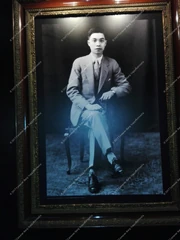The most important of the witnesses was Detective Nuttall, who said that the clothes belonging to the accused were sent to the Government Bacteriologist, but the analysis failed to find on them any traces of human blood.
Accused’s solicitor, Mr. W. J. Treadwell, said that he felt he would be lacking in his duty if he did not ask the Magistrate to take the responsibility of dismissing the information. He knew he was asking the Magistrate to accept no small responsibility and he knew of no other similar case in which the same request had been made. The Government Analyst’s report was decidedly in accused’s favor. It was palpable to everyone that if a jury on the evidence recorded a conviction they would be taking an extreme step. A mass of evidence had been called that the man was seen on May 30, and this evidence had been brought about solely by a statement of the accused to the police when he told them the story of what he was doing on the 31st. One would expect a guilty man to tell the police a story which they could not verify. Instead, he told them to the best of his belief his movements. All he had said was true down to the minutest instance, except that he had made a mistake in some of the events and said they had happened on the 30th instead of the 31st. If Toldy wanted to mislead the police, he would have told them false statements. The statements were those or a man who was conscious that the charges were utterly untenable and unfounded. If a man was to be convicted on the statements put forward during the case then he ventured to say the line of no man would be safe. There was nothing extraordinary about Toldy having been seen on the road or that he stopped suddenly and decided not to take the course he followed and took another course. Yet this was to be thrown up against him and that he wanted to avoid a man hours before the murder took place. Referring to the evening of the 31st, Mr. Treadwell asked the Magistrate whether he thought it possible that Toldy could have committed the murder and then acted in the careful, callous way which he did. The murder took place about 6 and Toldy was at the tram terminus at 6.40., calmly talking to the tramway officials and acting in a perfectly normal manner. He was again at the terminus at 9 p.m., talking again in the same unconcerned manner. There was not sufficient evidence to warrant Toldy being put on his trial. The police were to be commended for the way j they had done their duty, but all they had brought forward was some evidence that Toldy was seen on the road. Toldy had been in gaol for several weeks.
The Magistrate said that the evidence in the case was so helplessly weak that he did not think it possible for a jury to convict.
Mr. Marshall said that if the Magistrate said there was no case to answer his responsibility ended.
The Magistrate: The analyst’s report is against the prosecution. It had helped the prisoner.
Mr. Marshall said that the matter of the overcoat had not been satisfactorily explained. A number of witnesses had sworn that he was carrying another overcoat. The evidence also showed that the accused was avoiding recognition.
The Magistrate said that the witnesses so described the coat that it had become one of many colors. He asked Mr. Marshall whether the Grand Jury would find a true bill.
Mr. Marshall: I think they would.
The Magistrate: You would never get a conviction with the common jury.
The Magistrate also said that he felt his responsibility in the matter but would not shirk his duty.
Mr. Marshall said that it was not for him to press the matter unduly. However, he thought the Magistrate was accepting a grave responsibility if he dismissed the case.
The Magistrate said that he would I take five minutes to think the matter quietly over in his mind. He did not expect at this stage to he asked to dismiss the case.
On his return His Worship said that he had given the matter careful and anxious thought. He would be failing in his duty if he allowed it to go further on the present evidence, which did not establish a prima facie case. He was quite satisfied that no Grand Jury would return a true bill on the evidence, also that no common jury would be allowed to convict.
The big crowd in the Court received the decision with “Hear, hears." and hand-clapping.
Scroll and zoom on the map to explore locations in Wellington of significance to the Wellington Chinese community.
Loading map...
{"type":"ROADMAP","minzoom":false,"maxzoom":false,"types":["ROADMAP","SATELLITE","HYBRID","TERRAIN"],"mappingservice":"googlemaps3","width":"100%","height":"1000px","centre":{"text":"","title":"","link":"","lat":-41.29652591016889,"lon":174.77763980627,"icon":""},"title":"","label":"","icon":"","lines":[],"polygons":[],"circles":[],"rectangles":[],"copycoords":false,"static":false,"visitedicon":"","wmsoverlay":false,"zoom":17,"layers":[],"controls":["type","rotate"],"zoomstyle":"LARGE","typestyle":"DEFAULT","autoinfowindows":false,"resizable":false,"kmlrezoom":true,"poi":true,"cluster":false,"clustergridsize":60,"clustermaxzoom":20,"clusterzoomonclick":true,"clusteraveragecenter":true,"clusterminsize":2,"imageoverlays":[],"kml":[],"gkml":[],"searchmarkers":"all","fullscreen":false,"scrollwheelzoom":false,"locations":[{"text":"","title":"","link":"https://wellingtonchinesehistory.fandom.com/wiki/Ping_On_Restaurant","lat":-41.2918418861067,"lon":174.77812346549933,"icon":"","inlineLabel":"Ping On Restaurant\n"},{"text":"","title":"","link":"https://wellingtonchinesehistory.fandom.com/wiki/Ping_On_Restaurant","lat":-41.29291249535701,"lon":174.7801001736162,"icon":"","inlineLabel":"Ping On Restaurant\n"},{"text":"","title":"","link":"https://wellingtonchinesehistory.fandom.com/wiki/Bronze_Statue_Chinese_Gardener_in_Levin","lat":-40.622859369992256,"lon":175.2854417749722,"icon":"","inlineLabel":"Bronze Statue of Chinese Market Gardener\n"},{"text":"","title":"","link":"https://wellingtonchinesehistory.fandom.com/wiki/Sun_Park_Ngan","lat":-40.17400785010358,"lon":175.38623928470756,"icon":"","inlineLabel":"Sun Ngan Fruiterer \u0026amp; Greengrocer\n"},{"text":"","title":"","link":"https://wellingtonchinesehistory.fandom.com/wiki/Kwong_Kee_Lee_%26_Co","lat":-41.294158496269546,"lon":174.7848212596949,"icon":"","inlineLabel":"Kwong Kee Lee \u0026amp; Co\n"},{"text":"","title":"","link":"https://wellingtonchinesehistory.fandom.com/wiki/7_Majoribanks_Street","lat":-41.294130283072775,"lon":174.78479175539573,"icon":"","inlineLabel":"7 Majoribanks Street\n"},{"text":"","title":"","link":"https://wellingtonchinesehistory.fandom.com/wiki/Category:10_Daly_Street_(Lower_Hutt)","lat":-41.20840594346521,"lon":174.90181667616918,"icon":"","inlineLabel":"10 Daly Street (Lower Hutt)\n"},{"text":"","title":"","link":"https://wellingtonchinesehistory.fandom.com/wiki/Ming_Dynasty_Restaurant_(Lower_Hutt)","lat":-41.208422086461844,"lon":174.9018381338413,"icon":"","inlineLabel":"Ming Dynasty Restaurant (Lower Hutt)\n"},{"text":"","title":"","link":"https://wellingtonchinesehistory.fandom.com/wiki/China_City_Restaurant,_Upper_Hutt","lat":-41.12465069005611,"lon":175.06654506965893,"icon":"","inlineLabel":"China City Restaurant (Upper Hutt)\n"},{"text":"","title":"","link":"https://wellingtonchinesehistory.fandom.com/wiki/11_Main_Street_(Upper_Hutt)","lat":-41.12468099688517,"lon":175.06654909297245,"icon":"","inlineLabel":"11 Main Street (Upper Hutt)\n"},{"text":"","title":"","link":"https://wellingtonchinesehistory.fandom.com/wiki/Gee_Gee_%26_Co","lat":-40.357680826695564,"lon":175.6072373655555,"icon":"","inlineLabel":"Gee Gee \u0026amp; Co\n"},{"text":"","title":"","link":"https://wellingtonchinesehistory.fandom.com/wiki/Kwok_Houng","lat":-40.349313545005906,"lon":175.62324675586618,"icon":"","inlineLabel":"Kwok Houng\n"},{"text":"","title":"","link":"https://wellingtonchinesehistory.fandom.com/wiki/Joe_and_Joe","lat":-40.35546283219155,"lon":175.6096411568133,"icon":"","inlineLabel":"Joe and Joe\n"},{"text":"","title":"","link":"https://wellingtonchinesehistory.fandom.com/wiki/Joe_and_Joe","lat":-40.35556374551773,"lon":175.6073694237274,"icon":"","inlineLabel":"Joe and Joe\n"},{"text":"","title":"","link":"https://wellingtonchinesehistory.fandom.com/wiki/Joe_Kwong_Lee_%26_Co","lat":-40.35558016405187,"lon":175.60922607896333,"icon":"","inlineLabel":"Joe Kwong Lee \u0026amp; Co\n"},{"text":"","title":"","link":"https://wellingtonchinesehistory.fandom.com/wiki/Joe_Kwong_Lee_%26_Co","lat":-40.35477510287979,"lon":175.61080236306603,"icon":"","inlineLabel":"Joe Kwong Lee \u0026amp; Co\n"},{"text":"","title":"","link":"https://wellingtonchinesehistory.fandom.com/wiki/Peter_Joe","lat":-40.34789346692202,"lon":175.62880648139816,"icon":"","inlineLabel":"Peter Joe\n"},{"text":"","title":"","link":"https://wellingtonchinesehistory.fandom.com/wiki/Loo_Fon_%26_Co","lat":-40.35742582800649,"lon":175.61278161892392,"icon":"","inlineLabel":"Loo Fon \u0026amp; Co\n"},{"text":"","title":"","link":"https://wellingtonchinesehistory.fandom.com/wiki/H_Ping","lat":-40.354752830205385,"lon":175.6106369850956,"icon":"","inlineLabel":"H Ping\n"},{"text":"","title":"","link":"https://wellingtonchinesehistory.fandom.com/wiki/Ah_Tom","lat":-40.3567992932881,"lon":175.60889453962275,"icon":"","inlineLabel":"Ah Tom\n"},{"text":"","title":"","link":"https://wellingtonchinesehistory.fandom.com/wiki/On_Hang","lat":-40.35507983465122,"lon":175.60775819729363,"icon":"","inlineLabel":"On Hang\n"},{"text":"","title":"","link":"https://wellingtonchinesehistory.fandom.com/wiki/Joe_Lee_(Palmerston_North)","lat":-40.35520861752243,"lon":175.61299702372742,"icon":"","inlineLabel":"Joe Lee (Palmerston North)\n"},{"text":"","title":"","link":"https://wellingtonchinesehistory.fandom.com/wiki/Yee_Lee_(Palmerston_North)","lat":-40.35509565885185,"lon":175.60822115496475,"icon":"","inlineLabel":"Yee Lee (Palmerston North)\n"},{"text":"","title":"","link":"https://wellingtonchinesehistory.fandom.com/wiki/Kwong_Yen_%26_Co","lat":-39.929076306432975,"lon":175.04537475494632,"icon":"","inlineLabel":"Kwong Yen \u0026amp; Co\n"},{"text":"","title":"","link":"https://wellingtonchinesehistory.fandom.com/wiki/Ngan_Kee_%26_Co_(Whanganui)","lat":-39.931571460210456,"lon":175.04970879024623,"icon":"","inlineLabel":"Ngan Kee \u0026amp; Co (Whanganui)\n"},{"text":"","title":"","link":"https://wellingtonchinesehistory.fandom.com/wiki/Nanking_Fruit_Shop","lat":-39.930793485108865,"lon":175.04902480989097,"icon":"","inlineLabel":"Nanking Fruit Shop\n"},{"text":"","title":"","link":"https://wellingtonchinesehistory.fandom.com/wiki/T_Shing","lat":-39.931695802284324,"lon":175.04957438163743,"icon":"","inlineLabel":"T Shing\n"},{"text":"","title":"","link":"https://wellingtonchinesehistory.fandom.com/wiki/Tem_Young","lat":-39.91949228560728,"lon":175.06115695356647,"icon":"","inlineLabel":"Tem Young\n"},{"text":"","title":"","link":"https://wellingtonchinesehistory.fandom.com/wiki/Kwong_Chong","lat":-39.90659022076243,"lon":175.05200390238764,"icon":"","inlineLabel":"Kwong Chong\n"},{"text":"","title":"","link":"https://wellingtonchinesehistory.fandom.com/wiki/Sam_Lee_%26_Co","lat":-39.90386504178053,"lon":175.06033846913343,"icon":"","inlineLabel":"Sam Lee \u0026amp; Co\n"},{"text":"","title":"","link":"https://wellingtonchinesehistory.fandom.com/wiki/Nellie_Ngan_Kee","lat":-39.93074087527331,"lon":175.04833843960432,"icon":"","inlineLabel":"Nellie Ngan Kee\n"},{"text":"","title":"","link":"https://wellingtonchinesehistory.fandom.com/wiki/W_Wong","lat":-41.02527408171424,"lon":175.52725689263602,"icon":"","inlineLabel":"W Wong\n"},{"text":"","title":"","link":"https://wellingtonchinesehistory.fandom.com/wiki/Sun_Shing","lat":-41.024477057138434,"lon":175.52790336649883,"icon":"","inlineLabel":"Sun Shing\n"},{"text":"","title":"","link":"https://wellingtonchinesehistory.fandom.com/wiki/Wah_Lee_(Eketahuna)","lat":-40.64535235431796,"lon":175.70333082325925,"icon":"","inlineLabel":"Wah Lee (Eketahuna)\n"},{"text":"","title":"","link":"https://wellingtonchinesehistory.fandom.com/wiki/Gar_Wong","lat":-40.64556456058968,"lon":175.7034075088935,"icon":"","inlineLabel":"Gar Wong\n"},{"text":"","title":"","link":"https://wellingtonchinesehistory.fandom.com/wiki/Key_Yew","lat":-40.6451264565776,"lon":175.70328571406262,"icon":"","inlineLabel":"Key Yew\n"},{"text":"","title":"","link":"https://wellingtonchinesehistory.fandom.com/wiki/Hop_Lee_Brothers","lat":-40.227346435493544,"lon":175.56569653961716,"icon":"","inlineLabel":"Hop Lee Brothers\n"},{"text":"","title":"","link":"https://wellingtonchinesehistory.fandom.com/wiki/Joe_and_Ngan","lat":-40.227445161794,"lon":175.56450515311056,"icon":"","inlineLabel":"Joe and Ngan\n"},{"text":"","title":"","link":"https://wellingtonchinesehistory.fandom.com/wiki/Long_Kee_and_Co","lat":-40.22526305625269,"lon":175.56545315311044,"icon":"","inlineLabel":"Long Kee and Co\n"},{"text":"","title":"","link":"https://wellingtonchinesehistory.fandom.com/wiki/Kee_Lun","lat":-40.22426577064802,"lon":175.56316767399835,"icon":"","inlineLabel":"Kee Lun\n"},{"text":"","title":"","link":"https://wellingtonchinesehistory.fandom.com/wiki/P_Wah","lat":-40.22702076071631,"lon":175.56619813536668,"icon":"","inlineLabel":"P Wah\n"},{"text":"","title":"","link":"https://wellingtonchinesehistory.fandom.com/wiki/Joe_Young_Wah","lat":-40.22699576929569,"lon":175.56495811078153,"icon":"","inlineLabel":"Joe Young Wah\n"},{"text":"","title":"","link":"https://wellingtonchinesehistory.fandom.com/wiki/Yee_Lee_(Fielding)","lat":-40.25888440069234,"lon":175.53722692773653,"icon":"","inlineLabel":"Yee Lee (Fielding)\n"},{"text":"","title":"","link":"https://wellingtonchinesehistory.fandom.com/wiki/D_Young","lat":-40.206695788427034,"lon":175.6059654447573,"icon":"","inlineLabel":"D Young\n"},{"text":"","title":"","link":"https://wellingtonchinesehistory.fandom.com/wiki/Chung_Wah_Brothers","lat":-40.47340124204794,"lon":175.28156381264083,"icon":"","inlineLabel":"Chung Wah Brothers\n"},{"text":"","title":"","link":"https://wellingtonchinesehistory.fandom.com/wiki/L_Ming","lat":-41.08096389351957,"lon":175.45959502844826,"icon":"","inlineLabel":"L Ming\n"},{"text":"","title":"","link":"https://wellingtonchinesehistory.fandom.com/wiki/F_K_Leong","lat":-40.623597028714826,"lon":175.28513946606802,"icon":"","inlineLabel":"F K Leong\n"},{"text":"","title":"","link":"https://wellingtonchinesehistory.fandom.com/wiki/Wong_Shee","lat":-40.62327129908043,"lon":175.2850750930549,"icon":"","inlineLabel":"Wong Shee\n"},{"text":"","title":"","link":"https://wellingtonchinesehistory.fandom.com/wiki/G_C_Young","lat":-40.62255468829328,"lon":175.28586902688306,"icon":"","inlineLabel":"G C Young\n"},{"text":"","title":"","link":"https://wellingtonchinesehistory.fandom.com/wiki/On_J_Kwong_and_Co","lat":-41.21937483385046,"lon":175.45820947495233,"icon":"","inlineLabel":"On J Kwong and Co\n"},{"text":"","title":"","link":"https://wellingtonchinesehistory.fandom.com/wiki/Joe_Chong_Brothers_and_Co","lat":-40.06676976695588,"lon":175.37894604075754,"icon":"","inlineLabel":"Joe Chong Brothers and Co\n"},{"text":"","title":"","link":"https://wellingtonchinesehistory.fandom.com/wiki/Joe_Yin","lat":-40.06665736890061,"lon":175.37895468010046,"icon":"","inlineLabel":"Joe Yin\n"},{"text":"","title":"","link":"https://wellingtonchinesehistory.fandom.com/wiki/Joe_Lee_(Marton)","lat":-40.07663337516317,"lon":175.3791757021986,"icon":"","inlineLabel":"Joe Lee (Marton)\n"},{"text":"","title":"","link":"https://wellingtonchinesehistory.fandom.com/wiki/Dong_Gee_and_Son","lat":-40.9514501295631,"lon":175.65883821081303,"icon":"","inlineLabel":"Dong Gee and Son\n"},{"text":"","title":"","link":"https://wellingtonchinesehistory.fandom.com/wiki/H_On_Hing_and_Co","lat":-40.951433923327876,"lon":175.65917080471405,"icon":"","inlineLabel":"H On Hing and Co\n"},{"text":"","title":"","link":"https://wellingtonchinesehistory.fandom.com/wiki/G_Wong_and_Co","lat":-40.94885282788318,"lon":175.66258043964842,"icon":"","inlineLabel":"G Wong and Co\n"},{"text":"","title":"","link":"https://wellingtonchinesehistory.fandom.com/wiki/Nam_Wong_(Masterton)","lat":-40.94915340477588,"lon":175.66217675499058,"icon":"","inlineLabel":"Nam Wong (Masterton)\n"},{"text":"","title":"","link":"https://wellingtonchinesehistory.fandom.com/wiki/A1_Laundry_(W_Tai_Lee)","lat":-40.95166561155848,"lon":175.65822989916825,"icon":"","inlineLabel":"A1 Laundry (W Tai Lee)\n"},{"text":"","title":"","link":"https://wellingtonchinesehistory.fandom.com/wiki/Te_Aro_Seed_Co_(J._K_Louis,_Agent)","lat":-40.951369213863465,"lon":175.65930555813458,"icon":"","inlineLabel":"Te Aro Seed Co (J. K Louis, Agent)\n"},{"text":"","title":"","link":"https://wellingtonchinesehistory.fandom.com/wiki/Fung_Chan","lat":-39.402900015132225,"lon":175.4143223427123,"icon":"","inlineLabel":"Fung Chan\n"},{"text":"","title":"","link":"https://wellingtonchinesehistory.fandom.com/wiki/Yai_Hing","lat":-39.41436523679716,"lon":175.40206095307582,"icon":"","inlineLabel":"Yai Hing\n"},{"text":"","title":"","link":"https://wellingtonchinesehistory.fandom.com/wiki/Moon_Chung","lat":-39.41820649119466,"lon":175.40003163996215,"icon":"","inlineLabel":"Moon Chung\n"},{"text":"","title":"","link":"https://wellingtonchinesehistory.fandom.com/wiki/Joe_Lim","lat":-39.41820649119466,"lon":175.40003163996215,"icon":"","inlineLabel":"Joe Lim\n"},{"text":"","title":"","link":"https://wellingtonchinesehistory.fandom.com/wiki/Jack_Hing","lat":-40.75223174918318,"lon":175.13873021819876,"icon":"","inlineLabel":"Jack Hing\n"},{"text":"","title":"","link":"https://wellingtonchinesehistory.fandom.com/wiki/W_Lee","lat":-40.76253325322189,"lon":175.1560247745748,"icon":"","inlineLabel":"W Lee\n"},{"text":"","title":"","link":"https://wellingtonchinesehistory.fandom.com/wiki/Harry_Wong","lat":-40.75242522183432,"lon":175.13874068177913,"icon":"","inlineLabel":"Harry Wong\n"},{"text":"","title":"","link":"https://wellingtonchinesehistory.fandom.com/wiki/Y_Wong_Poy","lat":-40.45033224060335,"lon":175.84273433116326,"icon":"","inlineLabel":"Y Wong Poy\n"},{"text":"","title":"","link":"https://wellingtonchinesehistory.fandom.com/wiki/Wong_Hee_and_Co","lat":-40.45063064198456,"lon":175.8432553097998,"icon":"","inlineLabel":"Wong Hee and Co\n"},{"text":"","title":"","link":"https://wellingtonchinesehistory.fandom.com/wiki/K_Young_and_Co","lat":-40.45162640096501,"lon":175.8423677331264,"icon":"","inlineLabel":"K Young and Co\n"},{"text":"","title":"","link":"https://wellingtonchinesehistory.fandom.com/wiki/Tommy_Chan","lat":-39.426535566165285,"lon":175.27787384287842,"icon":"","inlineLabel":"Tommy Chan\n"},{"text":"","title":"","link":"https://wellingtonchinesehistory.fandom.com/wiki/Jhing_Lee","lat":-40.54715978057829,"lon":175.4107578482459,"icon":"","inlineLabel":"Jhing Lee\n"},{"text":"","title":"","link":"https://wellingtonchinesehistory.fandom.com/wiki/Shing_Tong_and_Co","lat":-39.67609392264077,"lon":175.79854195784668,"icon":"","inlineLabel":"Shing Tong and Co\n"},{"text":"","title":"","link":"https://wellingtonchinesehistory.fandom.com/wiki/Jang_Wong_and_Co","lat":-39.67581797916682,"lon":175.798721219313,"icon":"","inlineLabel":"Jang Wong and Co\n"},{"text":"","title":"","link":"https://wellingtonchinesehistory.fandom.com/wiki/Nam_Wong_(Taihape)","lat":-39.67585247216136,"lon":175.7984803367176,"icon":"","inlineLabel":"Nam Wong (Taihape)\n"},{"text":"","title":"","link":"https://wellingtonchinesehistory.fandom.com/wiki/A1_Laundry_(Joe_Dow)","lat":-39.67776660631267,"lon":175.79927743179655,"icon":"","inlineLabel":"A1 Laundry (Joe Dow)\n"},{"text":"","title":"","link":"https://wellingtonchinesehistory.fandom.com/wiki/Ah_Bing","lat":-39.76414297915377,"lon":174.63261607231908,"icon":"","inlineLabel":"Ah Bing\n"},{"text":"","title":"","link":"https://wellingtonchinesehistory.fandom.com/wiki/Lee_Wee_and_Co","lat":-40.33696246559797,"lon":175.86621967540248,"icon":"","inlineLabel":"Lee Wee and Co\n"},{"text":"","title":"","link":"https://wellingtonchinesehistory.fandom.com/wiki/The_Shanghai_Restaurant","lat":-41.292574377619445,"lon":174.77947357491865,"icon":"","inlineLabel":"The Shanghai Restaurant\n"},{"text":"","title":"","link":"https://wellingtonchinesehistory.fandom.com/wiki/Ying_King_Chinese_Takeaways","lat":-41.282351918373784,"lon":174.74616402398857,"icon":"","inlineLabel":"Ying King Chinese Takeaways\n"},{"text":"","title":"","link":"https://wellingtonchinesehistory.fandom.com/wiki/Category:143_Karori_Road","lat":-41.282350910577485,"lon":174.74613988410744,"icon":"","inlineLabel":"143 Karori Road\n"},{"text":"","title":"","link":"https://wellingtonchinesehistory.fandom.com/wiki/Sun_Tai_Wah","lat":-41.274648077272694,"lon":174.78351846329758,"icon":"","inlineLabel":"Sun Tai Wah\n"},{"text":"","title":"","link":"https://wellingtonchinesehistory.fandom.com/wiki/N_Gee_Wing","lat":-41.31334493134817,"lon":174.78132435129987,"icon":"","inlineLabel":"N Gee Wing\n"},{"text":"","title":"","link":"https://wellingtonchinesehistory.fandom.com/wiki/Moo_Lee","lat":-41.297762869331024,"lon":174.78452569541946,"icon":"","inlineLabel":"Moo Lee\n"},{"text":"","title":"","link":"https://wellingtonchinesehistory.fandom.com/wiki/Ching_Wah","lat":-40.20925087931049,"lon":176.09748726202992,"icon":"","inlineLabel":"Ching Wah\n"},{"text":"","title":"","link":"https://wellingtonchinesehistory.fandom.com/wiki/Wong_Lee","lat":-41.27421732064678,"lon":174.77775086162177,"icon":"","inlineLabel":"Wong Lee\n"},{"text":"","title":"","link":"https://wellingtonchinesehistory.fandom.com/wiki/Louis_Lock","lat":-41.27793464025943,"lon":174.7779915653582,"icon":"","inlineLabel":"Louis Lock\n"},{"text":"","title":"","link":"https://wellingtonchinesehistory.fandom.com/wiki/Wah_Chong_%26_Co","lat":-41.277406517116056,"lon":174.77783599723534,"icon":"","inlineLabel":"Wah Chong \u0026amp; Co\n"},{"text":"","title":"","link":"https://wellingtonchinesehistory.fandom.com/wiki/Leong_Wah_%26_Co","lat":-41.27446383666188,"lon":174.77776348249688,"icon":"","inlineLabel":"Leong Wah \u0026amp; Co\n"},{"text":"","title":"","link":"https://wellingtonchinesehistory.fandom.com/wiki/Leong_Chong_%26_Co","lat":-41.293973949853765,"lon":174.78442009435093,"icon":"","inlineLabel":"Leong Chong \u0026amp; Co\n"},{"text":"","title":"","link":"https://wellingtonchinesehistory.fandom.com/wiki/Category:Taranaki_Place","lat":-41.292352571977894,"lon":174.77844108767525,"icon":"","inlineLabel":"Taranaki Place\n"},{"text":"","title":"","link":"https://wellingtonchinesehistory.fandom.com/wiki/Hop_Lee_and_Co","lat":-41.29241403810164,"lon":174.77842231221214,"icon":"","inlineLabel":"Hop Lee and Co\n"},{"text":"","title":"","link":"https://wellingtonchinesehistory.fandom.com/wiki/Joe_Yow_Wah","lat":-41.29684017168395,"lon":174.77776354518446,"icon":"","inlineLabel":"Joe Yow Wah\n"},{"text":"","title":"","link":"https://wellingtonchinesehistory.fandom.com/wiki/Kwong_Tiy_Chong_%26_Co","lat":-41.296548982573185,"lon":174.7767080959371,"icon":"","inlineLabel":"Kwong Tiy Chong \u0026amp; Co\n"},{"text":"","title":"","link":"https://wellingtonchinesehistory.fandom.com/wiki/Kwong_On_%26_Co","lat":-41.29628378417613,"lon":174.77933504256717,"icon":"","inlineLabel":"Kwong On \u0026amp; Co\n"},{"text":"","title":"","link":"https://wellingtonchinesehistory.fandom.com/wiki/Kwong_Moon_Lee","lat":-41.29556512910439,"lon":174.7678929348007,"icon":"","inlineLabel":"Kwong Moon Lee\u200e\n"},{"text":"","title":"","link":"https://wellingtonchinesehistory.fandom.com/wiki/Joe_Lee_Brothers","lat":-41.29375827091918,"lon":174.78358203671664,"icon":"","inlineLabel":"Joe Lee Brothers\n"},{"text":"","title":"","link":"https://wellingtonchinesehistory.fandom.com/wiki/Joe_Lee_%26_Son","lat":-41.29605995218108,"lon":174.7795165231708,"icon":"","inlineLabel":"Joe Lee \u0026amp; Son\n"},{"text":"","title":"","link":"https://wellingtonchinesehistory.fandom.com/wiki/Joe_Lee","lat":-41.27580461660131,"lon":174.77980992654088,"icon":"","inlineLabel":"Joe Lee\n"},{"text":"","title":"","link":"https://wellingtonchinesehistory.fandom.com/wiki/Chinese_greengrocer,_Norsewood","lat":-40.07113930238144,"lon":176.21509707355943,"icon":"","inlineLabel":"Chinese greengrocer, Norsewood\n"},{"text":"","title":"","link":"https://wellingtonchinesehistory.fandom.com/wiki/100_Adelaide_Road","lat":-41.30469576022944,"lon":174.77858315421716,"icon":"","inlineLabel":"100 Adelaide Road\n"},{"text":"","title":"","link":"https://wellingtonchinesehistory.fandom.com/wiki/Wong_Ching_Gun_(aka_Wong_Chong)","lat":-41.304679137283024,"lon":174.77854895605222,"icon":"","inlineLabel":"Wong_Ching_Gun_(aka_Wong_Chong)\n"},{"text":"","title":"","link":"https://wellingtonchinesehistory.fandom.com/wiki/136_Riddiford_Street","lat":-41.312623957431946,"lon":174.7793768795115,"icon":"","inlineLabel":"136 Riddiford Street\n"},{"text":"","title":"","link":"https://wellingtonchinesehistory.fandom.com/wiki/136_Revans_Street","lat":-41.3126425930097,"lon":174.77937755006374,"icon":"","inlineLabel":"136 Revans Street\n"},{"text":"","title":"","link":"https://wellingtonchinesehistory.fandom.com/wiki/Man_Sing","lat":-41.31265417728507,"lon":174.77937755006374,"icon":"","inlineLabel":"Man Sing\n"},{"text":"","title":"","link":"https://wellingtonchinesehistory.fandom.com/wiki/Karori_Cemetery_Tung_Jung_Memorial","lat":-41.277435,"lon":174.749935,"icon":"","inlineLabel":"Karori Cemetery Tung Jung Memorial\n"},{"text":"","title":"","link":"https://wellingtonchinesehistory.fandom.com/wiki/205_Willis_Street","lat":-41.291794966261854,"lon":174.7733741018077,"icon":"","inlineLabel":"205 Willis Street\n"},{"text":"","title":"","link":"https://wellingtonchinesehistory.fandom.com/wiki/Hee_Chong_%26_Co","lat":-41.29180705806627,"lon":174.7734478625556,"icon":"","inlineLabel":"Hee Chong \u0026amp; Co\n"},{"text":"","title":"","link":"https://wellingtonchinesehistory.fandom.com/wiki/76_Kent_Terrace","lat":-41.299084783052955,"lon":174.78135046890475,"icon":"","inlineLabel":"76 Kent Terrace\n"},{"text":"","title":"","link":"https://wellingtonchinesehistory.fandom.com/wiki/Hop_Fook_Chong","lat":-41.299145235296194,"lon":174.7814684861014,"icon":"","inlineLabel":"Hop Fook Chong\n"},{"text":"","title":"","link":"https://wellingtonchinesehistory.fandom.com/wiki/58_Lambton_Quay","lat":-41.27910328761884,"lon":174.77759373745837,"icon":"","inlineLabel":"58 Lambton Quay\n"},{"text":"","title":"","link":"https://wellingtonchinesehistory.fandom.com/wiki/Hop_Tai_%26_Co","lat":-41.27904584034473,"lon":174.77756959757724,"icon":"","inlineLabel":"Hop Tai \u0026amp; Co\n"},{"text":"","title":"","link":"https://wellingtonchinesehistory.fandom.com/wiki/J_Wong_Wah_%26_Co","lat":-41.27905692666473,"lon":174.77757496199527,"icon":"","inlineLabel":"J Wong Wah \u0026amp; Co\n"},{"text":"","title":"","link":"https://wellingtonchinesehistory.fandom.com/wiki/85_Molesworth_Street","lat":-41.27454057320748,"lon":174.77774811791951,"icon":"","inlineLabel":"85 Molesworth Street\n"},{"text":"","title":"","link":"https://wellingtonchinesehistory.fandom.com/wiki/Fook_Wah","lat":-41.274562747376066,"lon":174.77774945902402,"icon":"","inlineLabel":"Fook Wah\n"},{"text":"","title":"","link":"https://wellingtonchinesehistory.fandom.com/wiki/Wong_Heong","lat":-41.29380517959402,"lon":174.78298675589662,"icon":"","inlineLabel":"Wong Heong\n"},{"text":"","title":"","link":"https://wellingtonchinesehistory.fandom.com/wiki/67_Courtenay_Place","lat":-41.29335281745621,"lon":174.78040977524086,"icon":"","inlineLabel":"67 Courtenay Place\n"},{"text":"","title":"","link":"https://wellingtonchinesehistory.fandom.com/wiki/59_Taranaki_Street","lat":-41.29311882425348,"lon":174.77869199788486,"icon":"","inlineLabel":"59 Taranaki Street\n"},{"text":"","title":"","link":"https://wellingtonchinesehistory.fandom.com/wiki/Fon_Lee","lat":-41.29307348088719,"lon":174.77870540892994,"icon":"","inlineLabel":"Fon Lee\n"},{"text":"","title":"","link":"https://wellingtonchinesehistory.fandom.com/wiki/7_Adelaide_Road","lat":-41.30152050430543,"lon":174.77997665236032,"icon":"","inlineLabel":"7 Adelaide Road\n"},{"text":"","title":"","link":"https://wellingtonchinesehistory.fandom.com/wiki/Fong_Lee","lat":-41.30152050430543,"lon":174.77987070510423,"icon":"","inlineLabel":"Fong Lee\n"},{"text":"","title":"","link":"https://wellingtonchinesehistory.fandom.com/wiki/358_Lambton_Quay","lat":-41.28623356178048,"lon":174.7759089179101,"icon":"","inlineLabel":"358 Lambton Quay\n"},{"text":"","title":"","link":"https://wellingtonchinesehistory.fandom.com/wiki/Fook_Lee_%26_Co","lat":-41.28617309757105,"lon":174.77599206638956,"icon":"","inlineLabel":"Fook Lee \u0026amp; Co\n"},{"text":"","title":"","link":"https://wellingtonchinesehistory.fandom.com/wiki/11_Ellice_Street","lat":-41.29977611508634,"lon":174.78169741767698,"icon":"","inlineLabel":"11 Ellice Street\n"},{"text":"","title":"","link":"https://wellingtonchinesehistory.fandom.com/wiki/Chow_Boor","lat":-41.299743874208794,"lon":174.78172960418516,"icon":"","inlineLabel":"Chow Boor\n"},{"text":"","title":"","link":"https://wellingtonchinesehistory.fandom.com/wiki/A_Gee_Fung_Brothers","lat":-41.29659530855283,"lon":174.7855597790775,"icon":"","inlineLabel":"A Gee Fung Brothers\n"},{"text":"","title":"","link":"https://wellingtonchinesehistory.fandom.com/wiki/45_Brougham_Street","lat":-41.29660941461967,"lon":174.78559196558567,"icon":"","inlineLabel":"45 Brougham Street\n"},{"text":"","title":"","link":"https://wellingtonchinesehistory.fandom.com/wiki/163_Tinakori_Road","lat":-41.274082443626696,"lon":174.7749174850989,"icon":"","inlineLabel":"163 Tinakori Road\n"},{"text":"","title":"","link":"https://wellingtonchinesehistory.fandom.com/wiki/Brothers_Laundry","lat":-41.27404615835266,"lon":174.77495503602512,"icon":"","inlineLabel":"Brothers Laundry\n"},{"text":"","title":"","link":"https://wellingtonchinesehistory.fandom.com/wiki/322_Tinakori_Road","lat":-41.27828540577189,"lon":174.7697586560833,"icon":"","inlineLabel":"322 Tinakori Road\n"},{"text":"","title":"","link":"https://wellingtonchinesehistory.fandom.com/wiki/Charley_Quoy","lat":-41.27829069703194,"lon":174.7697563091504,"icon":"","inlineLabel":"Charley Quoy\n"},{"text":"","title":"","link":"https://wellingtonchinesehistory.fandom.com/wiki/Great_Wall_Cafe","lat":-41.29344706535046,"lon":174.77607735265576,"icon":"","inlineLabel":"Great Wall Cafe\n"},{"text":"","title":"","link":"https://wellingtonchinesehistory.fandom.com/wiki/Chinese_Anglican_Church","lat":-41.29861491218293,"lon":174.7752375848081,"icon":"","inlineLabel":"Chinese Anglican Church\n"},{"text":"","title":"","link":"https://wellingtonchinesehistory.fandom.com/wiki/Chee_Kung_Tong_Chinese_Freemasons","lat":-41.295701084109766,"lon":174.77746164021238,"icon":"","inlineLabel":"Chee Kung Tong Chinese Freemasons\n"},{"text":"","title":"","link":"https://wellingtonchinesehistory.fandom.com/wiki/Chee_Kung_Tong_Chinese_Freemasons","lat":-41.29646508971798,"lon":174.77789280531152,"icon":"","inlineLabel":"Chee Kung Tong Chinese Freemasons\n"},{"text":"","title":"","link":"https://wellingtonchinesehistory.fandom.com/wiki/9-11_Marion_Street","lat":-41.294088088327044,"lon":174.77679846005117,"icon":"","inlineLabel":"9-11 Marion Street\n"},{"text":"","title":"","link":"https://wellingtonchinesehistory.fandom.com/wiki/Chinese_Baptist_Church","lat":-41.304570558214444,"lon":174.77900801298415,"icon":"","inlineLabel":"Chinese Baptist Church\n"},{"text":"","title":"","link":"https://wellingtonchinesehistory.fandom.com/wiki/Quing_Kee_and_Co._fruiterers","lat":-40.20949612294982,"lon":176.09660895415004,"icon":"","inlineLabel":"Quing Kee and Co.\n"},{"text":"","title":"","link":"https://wellingtonchinesehistory.fandom.com/wiki/Lee_Wong_Laundry","lat":-40.209539138782404,"lon":176.096600907523,"icon":"","inlineLabel":"Lee Wong Laundry\n"},{"text":"","title":"","link":"https://wellingtonchinesehistory.fandom.com/wiki/Category:Dannevirke","lat":-40.2084062315148,"lon":176.09547189613772,"icon":"","inlineLabel":"Dannevirke\n"},{"text":"","title":"","link":"https://wellingtonchinesehistory.fandom.com/wiki/Lue_Lee_Laundry","lat":-41.2927184216299,"lon":174.77363156355534,"icon":"","inlineLabel":"Lue Lee Laundry\n"},{"text":"","title":"","link":"https://wellingtonchinesehistory.fandom.com/wiki/W_Sing_Laundry","lat":-41.29274562780152,"lon":174.7737857905737,"icon":"","inlineLabel":"W Sing Laundry\n"},{"text":"\u003Cdiv class=\"mw-parser-output\"\u003E\u003Cp\u003E17 Quin Street\n\u003C/p\u003E\u003C/div\u003E","title":"17 Quin Street\n","link":"","lat":-41.29275973470089,"lon":174.77377506173764,"icon":"","inlineLabel":"","visitedicon":"17 Quin Street"},{"text":"","title":"","link":"https://wellingtonchinesehistory.fandom.com/wiki/Category:Quin_Street","lat":-41.29284336839862,"lon":174.77361949361477,"icon":"","inlineLabel":"Quin Street\n"},{"text":"","title":"","link":"https://wellingtonchinesehistory.fandom.com/wiki/144_Tory_Street","lat":-41.29718548209419,"lon":174.7789377934813,"icon":"","inlineLabel":"144 Tory Street\n"},{"text":"","title":"","link":"https://wellingtonchinesehistory.fandom.com/wiki/Wong_She_%26_Co","lat":-41.29091341269092,"lon":174.77722607204385,"icon":"","inlineLabel":"Wong She \u0026amp; Co\n"},{"text":"","title":"","link":"https://wellingtonchinesehistory.fandom.com/wiki/Category:William_Wong_Place","lat":-41.02353385743459,"lon":175.52636888841948,"icon":"","inlineLabel":"William Wong Place\n"},{"text":"","title":"","link":"https://wellingtonchinesehistory.fandom.com/wiki/Category:Korokoro","lat":-41.21978920497062,"lon":174.87050854340907,"icon":"","inlineLabel":"Korokoro\n"},{"text":"","title":"","link":"https://wellingtonchinesehistory.fandom.com/wiki/Category:George_Gee_Drive","lat":-41.213975424803614,"lon":174.87325227835936,"icon":"","inlineLabel":"George Gee Drive\n"},{"text":"","title":"","link":"https://wellingtonchinesehistory.fandom.com/wiki/Category:Palmerston_North","lat":-40.35606862679311,"lon":175.61218745349265,"icon":"","inlineLabel":"Palmerston North\n"},{"text":"","title":"","link":"https://wellingtonchinesehistory.fandom.com/wiki/192_Lambton_Quay","lat":-41.28234516784606,"lon":174.77581639614402,"icon":"","inlineLabel":"192 Lambton Quay\n"},{"text":"","title":"","link":"https://wellingtonchinesehistory.fandom.com/wiki/L_Yen_%26_Company","lat":-41.282232291648334,"lon":174.7758417248507,"icon":"","inlineLabel":"L Yen \u0026amp; Company\n"},{"text":"","title":"","link":"https://wellingtonchinesehistory.fandom.com/wiki/Category:New_Zealand_Chinese_Association","lat":-41.294556732305956,"lon":174.77643307022015,"icon":"","inlineLabel":"New Zealand Chinese Association\n"},{"text":"","title":"","link":"https://wellingtonchinesehistory.fandom.com/wiki/Category:Marion_Street","lat":-41.29374437811993,"lon":174.77671895127185,"icon":"","inlineLabel":"Marion Street\n"},{"text":"","title":"","link":"https://wellingtonchinesehistory.fandom.com/wiki/Category:Wellington_Hospital","lat":-41.30803545853666,"lon":174.77909088134766,"icon":"","inlineLabel":"Wellington Hospital\n"},{"text":"","title":"","link":"https://wellingtonchinesehistory.fandom.com/wiki/Chong_Lee_and_Co","lat":-41.51147763599755,"lon":173.95668536424637,"icon":"","inlineLabel":"Chong Lee and Co (estimated second location)\n"},{"text":"","title":"","link":"https://wellingtonchinesehistory.fandom.com/wiki/Category:Blenheim","lat":-41.51344593579408,"lon":173.95989060401917,"icon":"","inlineLabel":"Blenheim\n"},{"text":"","title":"","link":"https://wellingtonchinesehistory.fandom.com/wiki/Category:Market_Street","lat":-41.51315671998313,"lon":173.95658612251282,"icon":"","inlineLabel":"Market Street\n"},{"text":"","title":"","link":"https://wellingtonchinesehistory.fandom.com/wiki/Chong_Lee_and_Co","lat":-41.51361866128708,"lon":173.95666927099228,"icon":"","inlineLabel":"Chong Lee and Co (estimated first location)\n"},{"text":"","title":"","link":"https://wellingtonchinesehistory.fandom.com/wiki/Wellington_Chinese_Sports_and_Cultural_Centre","lat":-41.32739480322895,"lon":174.78082090616226,"icon":"","inlineLabel":"Wellington Chinese Sports and Cultural Centre\n"},{"text":"","title":"","link":"https://wellingtonchinesehistory.fandom.com/wiki/Tung_Jung_Association","lat":-41.29879493496816,"lon":174.7732999920845,"icon":"","inlineLabel":"Tung Jung Association (2002-Present)\n"},{"text":"","title":"","link":"https://wellingtonchinesehistory.fandom.com/wiki/Te_Aro_Seed_Company","lat":-41.29336808621374,"lon":174.78129968047142,"icon":"","inlineLabel":"Te Aro Seed Company (1914-1984)\n"},{"text":"","title":"","link":"https://wellingtonchinesehistory.fandom.com/wiki/New_Zealand_Seyip_Association","lat":-41.293856,"lon":174.77705200000003,"icon":"","inlineLabel":"New Zealand Seyip Association\n"},{"text":"","title":"","link":"https://wellingtonchinesehistory.fandom.com/wiki/Tung_Jung_Association","lat":-41.29669115265043,"lon":174.77894335985184,"icon":"","inlineLabel":"Tung Jung Association (1936-1991)\n"},{"text":"","title":"","link":"https://wellingtonchinesehistory.fandom.com/wiki/Category:Frederick_Street","lat":-41.296461425184496,"lon":174.77809846401215,"icon":"","inlineLabel":"Frederick Street\n"},{"text":"","title":"","link":"https://wellingtonchinesehistory.fandom.com/wiki/Cnr_Manners_%26_Herbert_(Victoria)_Streets","lat":-41.29045195092481,"lon":174.77572202682495,"icon":"","inlineLabel":"Cnr Manners \u0026amp; Herbert (Victoria) Streets\n"},{"text":"","title":"","link":"https://wellingtonchinesehistory.fandom.com/wiki/Category:Haining_Street","lat":-41.29676772829261,"lon":174.777894616127,"icon":"","inlineLabel":"Haining Street\n"},{"text":"","title":"","link":"https://wellingtonchinesehistory.fandom.com/wiki/Category:China_Town","lat":-41.29652591016889,"lon":174.7776398062706,"icon":"","inlineLabel":"China Town\n"},{"text":"","title":"","link":"https://wellingtonchinesehistory.fandom.com/wiki/Han_Fon","lat":-41.29642313719485,"lon":174.7778905928135,"icon":"","inlineLabel":"Han Fon Laundry (1913)\n"},{"text":"","title":"","link":"https://wellingtonchinesehistory.fandom.com/wiki/Charlie_Yung_Sing","lat":-41.29652591016889,"lon":174.7779831290245,"icon":"","inlineLabel":"Charlie Yung Sing (Residence 1913)\n"},{"text":"","title":"","link":"https://wellingtonchinesehistory.fandom.com/wiki/Chinese_Anglican_Mission_Church_Hall","lat":-41.296119855219565,"lon":174.77729581296444,"icon":"","inlineLabel":"Chinese Anglican Mission Church Hall\n"},{"text":"","title":"","link":"https://wellingtonchinesehistory.fandom.com/wiki/Category:Courtenay_Place","lat":-41.29318066747841,"lon":174.78048026561737,"icon":"","inlineLabel":"Courtenay Place\n"},{"text":"","title":"","link":"https://wellingtonchinesehistory.fandom.com/wiki/Category:Manners_Street","lat":-41.291528134894676,"lon":174.77734744548798,"icon":"","inlineLabel":"Manners Street\n"},{"text":"","title":"","link":"https://wellingtonchinesehistory.fandom.com/wiki/Category:Cuba_Street","lat":-41.2936401447101,"lon":174.7755664587021,"icon":"","inlineLabel":"Cuba Street\n"},{"text":"","title":"","link":"https://wellingtonchinesehistory.fandom.com/wiki/Category:Victoria_(Herbert)_Street","lat":-41.291250021637275,"lon":174.77524995803833,"icon":"","inlineLabel":"Victoria (Herbert) Street\n"},{"text":"","title":"","link":"https://wellingtonchinesehistory.fandom.com/wiki/Category:Victoria_Street","lat":-41.28971433143347,"lon":174.77586686611176,"icon":"","inlineLabel":"Victoria Street\n"},{"text":"","title":"","link":"https://wellingtonchinesehistory.fandom.com/wiki/Yuen_Tung_%26_Co","lat":-41.297206555818896,"lon":174.77894827233405,"icon":"","inlineLabel":"Yuen Tung \u0026amp; Co\n"},{"text":"","title":"","link":"https://wellingtonchinesehistory.fandom.com/wiki/Category:Tory_Street","lat":-41.29699342439922,"lon":174.7791874408722,"icon":"","inlineLabel":"Tory Street\n"},{"text":"","title":"","link":"https://wellingtonchinesehistory.fandom.com/wiki/Hop_Sing_Market_Garden","lat":-41.303957377547974,"lon":174.77869391441345,"icon":"","inlineLabel":"Hop Sing Market Garden\n"},{"text":"","title":"","link":"https://wellingtonchinesehistory.fandom.com/wiki/Category:Adelaide_Road","lat":-41.305827201284,"lon":174.77839350700378,"icon":"","inlineLabel":"Adelaide Road\n"},{"text":"","title":"","link":"https://wellingtonchinesehistory.fandom.com/wiki/Category:Tasman_Street","lat":-41.304263645452444,"lon":174.77665543556213,"icon":"","inlineLabel":"Tasman Street\n"},{"text":"","title":"","link":"https://wellingtonchinesehistory.fandom.com/wiki/Category:Drummond_Street","lat":-41.30504945783762,"lon":174.77803140878677,"icon":"","inlineLabel":"","visitedicon":"Drummond Street"},{"text":"","title":"","link":"https://wellingtonchinesehistory.fandom.com/wiki/Category:Douglas_Street","lat":-41.30208750019478,"lon":174.77858126163483,"icon":"","inlineLabel":"Douglas Street\n"},{"text":"","title":"","link":"https://wellingtonchinesehistory.fandom.com/wiki/Hoy_Leung_Market_Garden","lat":-41.292459201084256,"lon":174.77301567792892,"icon":"","inlineLabel":"Hoy Leung Market Garden\n"},{"text":"","title":"","link":"https://wellingtonchinesehistory.fandom.com/wiki/Wong_Tann_Market_Garden","lat":-41.31719812110744,"lon":174.78083431720734,"icon":"","inlineLabel":"Wong Tann Market Garden\n"},{"text":"","title":"","link":"https://wellingtonchinesehistory.fandom.com/wiki/Category:Mansfield_Street","lat":-41.317939458769104,"lon":174.781134724617,"icon":"","inlineLabel":"Mansfield Street\n"},{"text":"","title":"","link":"https://wellingtonchinesehistory.fandom.com/wiki/Ah_Go_Market_Garden","lat":-41.301414492422516,"lon":174.77734208106995,"icon":"","inlineLabel":"Ah Go Market Garden\n"},{"text":"","title":"","link":"https://wellingtonchinesehistory.fandom.com/wiki/Category:Mount_Cook","lat":-41.30092685969741,"lon":174.77602243423462,"icon":"","inlineLabel":"Mount Cook\n"},{"text":"","title":"","link":"https://wellingtonchinesehistory.fandom.com/wiki/Category:Newtown","lat":-41.310856116317744,"lon":174.77962732315063,"icon":"","inlineLabel":"Newtown\n"},{"text":"","title":"","link":"https://wellingtonchinesehistory.fandom.com/wiki/Yee_Chong_Wing_%26_Co","lat":-41.29040358268907,"lon":174.77561473846436,"icon":"","inlineLabel":"Yee Chong Wing \u0026amp; Co (1890s-1910)\n"},{"text":"","title":"","link":"https://wellingtonchinesehistory.fandom.com/wiki/Sun_Kwong_Lee_%26_Co","lat":-41.29030281541611,"lon":174.77552354335785,"icon":"","inlineLabel":"Sun Kwong Lee \u0026amp; Co\n"},{"text":"","title":"","link":"https://wellingtonchinesehistory.fandom.com/wiki/Dick_Lee_%26_Co","lat":-41.29593748232295,"lon":174.77962464094162,"icon":"","inlineLabel":"Dick Lee \u0026amp; Co\n"},{"text":"","title":"","link":"https://wellingtonchinesehistory.fandom.com/wiki/Tung_Jung_Association","lat":-41.298271010851224,"lon":174.7747916355729,"icon":"","inlineLabel":"Tung Jung Association (1991-2002)\n"},{"text":"","title":"","link":"https://wellingtonchinesehistory.fandom.com/wiki/Te_Aro_Seed_Company","lat":-41.29447898459789,"lon":174.77496061474085,"icon":"","inlineLabel":"Te Aro Seed Company (1910-1913)\n"},{"text":"","title":"","link":"https://wellingtonchinesehistory.fandom.com/wiki/Category:Webb_Street","lat":-41.29796269969234,"lon":174.7740925848484,"icon":"","inlineLabel":"Webb Street\n"},{"text":"","title":"","link":"https://wellingtonchinesehistory.fandom.com/wiki/Joe_Kum_Yung","lat":-41.29701962121815,"lon":174.7784572094679,"icon":"","inlineLabel":"Joe Kum Yung Memorial\n"},{"text":"","title":"","link":"https://wellingtonchinesehistory.fandom.com/wiki/Wong_Tong_and_Sons","lat":-41.296181317793604,"lon":174.7741650044918,"icon":"","inlineLabel":"Wong Tong and Sons (1)\n"},{"text":"","title":"","link":"https://wellingtonchinesehistory.fandom.com/wiki/Wong_Tong_and_Sons","lat":-41.294335400157046,"lon":174.7749676555395,"icon":"","inlineLabel":"Wong Tong and Sons (2)\n"},{"text":"","title":"","link":"https://wellingtonchinesehistory.fandom.com/wiki/New_Zealand_China_Friendship_Society","lat":-41.29807353066887,"lon":174.78002965450287,"icon":"","inlineLabel":"New Zealand China Friendship Society (Wellington Branch)\n"},{"text":"","title":"","link":"https://wellingtonchinesehistory.fandom.com/wiki/Wong_She_%26_Co","lat":-41.29629013663511,"lon":174.77407045662403,"icon":"","inlineLabel":"Wong She \u0026amp; Co\n"},{"text":"","title":"","link":"https://wellingtonchinesehistory.fandom.com/wiki/Wong_She_%26_Co","lat":-41.28113939678229,"lon":174.77575857192278,"icon":"","inlineLabel":"Wong She \u0026amp; Co\n"},{"text":"","title":"","link":"https://wellingtonchinesehistory.fandom.com/wiki/New_Zealand_Chinese_Association_Private_Hotel","lat":-41.29406737502187,"lon":174.77673590183258,"icon":"","inlineLabel":"New Zealand Chinese Association Private Hotel\n"},{"text":"","title":"","link":"https://wellingtonchinesehistory.fandom.com/wiki/Wing_Shing_and_Co","lat":-41.296889644590046,"lon":174.77380357682705,"icon":"","inlineLabel":"Wing Shing and Co\n"},{"text":"","title":"","link":"https://wellingtonchinesehistory.fandom.com/wiki/Wing_Hing_%26_Co","lat":-41.295386330193814,"lon":174.77663062512875,"icon":"","inlineLabel":"Wing Hing \u0026amp; Co\n"},{"text":"","title":"","link":"https://wellingtonchinesehistory.fandom.com/wiki/Wing_Hing_%26_Co","lat":-41.29307083581877,"lon":174.77264754474163,"icon":"","inlineLabel":"Wing Hing \u0026amp; Co\n"},{"text":"","title":"","link":"https://wellingtonchinesehistory.fandom.com/wiki/Poon_Fah_Association","lat":-41.29484121902841,"lon":174.77538004517555,"icon":"","inlineLabel":"Poon Fah Association\n"},{"text":"","title":"","link":"https://wellingtonchinesehistory.fandom.com/wiki/Eva_and_Joe_Shue_(Fruit_shop)","lat":-41.330071621085125,"lon":174.79189977049828,"icon":"","inlineLabel":"Eva and Joe Shue (Fruit shop)\n"},{"text":"","title":"","link":"https://wellingtonchinesehistory.fandom.com/wiki/Category:Lower_Hutt","lat":-41.20980056285916,"lon":174.90181803703308,"icon":"","inlineLabel":"Lower Hutt\n"},{"text":"","title":"","link":"https://wellingtonchinesehistory.fandom.com/wiki/Category:Wellington","lat":-41.280983185265946,"lon":174.7793886065483,"icon":"","inlineLabel":"Wellington\n"},{"text":"","title":"","link":"https://wellingtonchinesehistory.fandom.com/wiki/Category:Upper_Hutt","lat":-41.124536081217535,"lon":175.06950438022614,"icon":"","inlineLabel":"Upper Hutt\n"},{"text":"","title":"","link":"https://wellingtonchinesehistory.fandom.com/wiki/Category:Wairarapa","lat":-41.00892073500488,"lon":175.52101135253906,"icon":"","inlineLabel":"Wairarapa\n"},{"text":"","title":"","link":"https://wellingtonchinesehistory.fandom.com/wiki/Category:Masterton","lat":-40.94933921104971,"lon":175.6604164838791,"icon":"","inlineLabel":"Masterton\n"},{"text":"","title":"","link":"https://wellingtonchinesehistory.fandom.com/wiki/Category:Carterton","lat":-41.027247663852265,"lon":175.5253565311432,"icon":"","inlineLabel":"Carterton\n"},{"text":"","title":"","link":"https://wellingtonchinesehistory.fandom.com/wiki/Category:Greytown","lat":-41.07986874098994,"lon":175.46095669269562,"icon":"","inlineLabel":"Greytown\n"},{"text":"","title":"","link":"https://wellingtonchinesehistory.fandom.com/wiki/Category:Featherston","lat":-41.11712461815237,"lon":175.32541930675507,"icon":"","inlineLabel":"Featherston\n"},{"text":"","title":"","link":"https://wellingtonchinesehistory.fandom.com/wiki/Category:K%C4%81piti","lat":-40.82212357516944,"lon":175.05340576171875,"icon":"","inlineLabel":"K\u0101piti\n"},{"text":"","title":"","link":"https://wellingtonchinesehistory.fandom.com/wiki/Category:Horowhenua","lat":-40.32560799973207,"lon":175.44891357421875,"icon":"","inlineLabel":"Horowhenua\n"},{"text":"","title":"","link":"https://wellingtonchinesehistory.fandom.com/wiki/Category:Paraparaumu","lat":-40.915944862700044,"lon":175.0035059452057,"icon":"","inlineLabel":"Paraparaumu\n"},{"text":"","title":"","link":"https://wellingtonchinesehistory.fandom.com/wiki/Category:Bulls","lat":-40.174561452633974,"lon":175.38485169410706,"icon":"","inlineLabel":"Bulls\n"},{"text":"","title":"","link":"https://wellingtonchinesehistory.fandom.com/wiki/Category:Moxham_Avenue","lat":-41.30594003375956,"lon":174.79341387748718,"icon":"","inlineLabel":"Moxham Avenue\n"},{"text":"","title":"","link":"https://wellingtonchinesehistory.fandom.com/wiki/Category:Hataitai","lat":-41.30405409388374,"lon":174.79310274124146,"icon":"","inlineLabel":"Hataitai\n"},{"text":"","title":"","link":"https://wellingtonchinesehistory.fandom.com/wiki/Category:140_Moxham_Avenue","lat":-41.30967951390707,"lon":174.79200437664986,"icon":"","inlineLabel":"140 Moxham Avenue\n"},{"text":"","title":"","link":"https://wellingtonchinesehistory.fandom.com/wiki/5_Majoribanks_Street","lat":-41.29415769531853,"lon":174.7846738215361,"icon":"","inlineLabel":"5 Majoribanks Street\n"},{"text":"","title":"","link":"https://wellingtonchinesehistory.fandom.com/wiki/Category:Norsewood","lat":-40.06992861899493,"lon":176.21657843146926,"icon":"","inlineLabel":"Norsewood\n"},{"text":"","title":"","link":"https://wellingtonchinesehistory.fandom.com/wiki/Category:Pahiatua_Seed_Co","lat":-40.452319912882956,"lon":175.84143322767812,"icon":"","inlineLabel":"Pahiatua Seed Company\n"},{"text":"","title":"","link":"https://wellingtonchinesehistory.fandom.com/wiki/Pahiatua","lat":-40.45287290733342,"lon":175.84102382655053,"icon":"","inlineLabel":"Pahiatua\n"},{"text":"","title":"","link":"https://wellingtonchinesehistory.fandom.com/wiki/Category:Main_Street_(Pahiatua)","lat":-40.45379543293029,"lon":175.8403693675509,"icon":"","inlineLabel":"Main Street (Pahiatua)\n"},{"text":"","title":"","link":"https://wellingtonchinesehistory.fandom.com/wiki/Tan_Kee","lat":-40.45237490152607,"lon":175.84146370882897,"icon":"","inlineLabel":"Tan Kee\n"}]}

